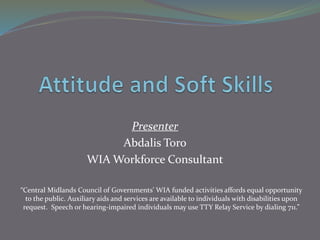
Attitude and Soft Skills
- 1. Presenter Abdalis Toro WIA Workforce Consultant “Central Midlands Council of Governments' WIA funded activities affords equal opportunity to the public. Auxiliary aids and services are available to individuals with disabilities upon request. Speech or hearing-impaired individuals may use TTY Relay Service by dialing 711.”
- 2. What is an attitude? A settled way of thinking or feeling about someone or something, typically reflected in a person's behavior. A complex mental state involving beliefs, feelings, values, and dispositions to act in certain ways. Personal biases, preferences, and subjective assessments that predispose one to act or respond in a predictable manner.
- 3. Bad vs. Good. Who will win? Bad attitude = when an employee has a negative view of about work and colleagues, is unmotivated, and extremely sensitive to the comments of others or work habits in a negative way. Good attitude = an untaught behavioral skill. It represents the reactive nature of the individual and is about looking at things with the right perspective being ready to solve problems, create win-win situations, taking ownership of actions, & lead with resilience.
- 4. What Are Soft Skills? Personal characteristics that enhance an individual's interactions, job performance and career prospects. Unlike hard skills, which are about a person's skill set and ability to perform a certain type of task or activity, soft skills are interpersonal and broadly applicable.
- 5. Examples of Soft Skills Communication skills Leadership ability Strong work ethic Negotiation Customer Service Hard Working Team Player Integrity Good attitude
- 6. Why are they so important? Employers may be willing to work on training employees on hard skills and hire individuals because of their strong people skills. Employees with a good attitude and strong soft skills are much more likely to be promoted. Drives companies’ morale, success, and development Helps employees to excel in the workplace Contributes to making job seekers stand out Results in higher positive references
- 7. Why are they so important? You are expected to know how to behave well at the job Allows people to participate fully in team projects & show appreciation for others Excel a leader Job durability Personal enrichment Flexibility Portability Fosters great team performance, and leads people to contribute strongly to the organization's vision and strategy
- 8. How to improve your soft skills? Build self-awareness Understand other people’s motivations Don’t try to eat a cow in one bite It’s all about changing yourself not others Practice, Practice, Practice
- 9. How to improve your soft skills? Greet your family members first thing in the morning Greet & smile at your peers, subordinates & boss once you enter the office. Greet your friends along the way Continuously reciprocate to encourage communication Be a proactive listener & empathize Watch your tone & tenor of voice. Soothing & audible. Do not provoke others with your communication.
- 10. How to improve your soft skills? Dress well to suit your profession & to create positive vibes in your workplace. Avoid political & religious comments in the workplace, especially in groups. Do not talk about others behind their back. Treat others as you would like to be treated.
- 11. A final thought… “The longer I live, the more I realize the impact of attitude on life. Attitude, to me, is more important than facts. It is more important than the past, the education, the money, than circumstances, than failure, than successes, than appearance, giftedness, or skill. It will make or break a company…a church…a home. The remarkable thing is we have a choice everyday regarding the attitude we will embrace for that day. We cannot change our past…we cannot change the inevitable. The only thing we can do is play on the one string we have, and that is our attitude. I am convinced that life is 10% what happens to me and 90% of how I react to it. And so it is with you…we are in charge of our attitudes.” ~ Charles Swindoll
- 12. Questions? Please provide feedback about what you thought about this workshop. Your feedback is valued and greatly appreciated. Thank you!
Notas del editor
- Attitudes lead people to like or dislike something, or to consider things good or bad, important or unimportant, worth caring about or not worth caring about.
- Refer to hand out “The Consequence of Attitude” to expand on bad attitude and its consequences, if necessary.
- Refer attendees to the hand out “The Top 60 Soft Skills at Work” for more information.
